So new?
« previous post | next post »
David Craig asked whether Anand Giridharadas is suffering from the Recency Illusion in his small piece on "so" (Follow My Logic? A Connective Word Takes the Lead, NYT 5/21/2010), which observes that
“So” may be the new “well,” “um,” “oh” and “like.” No longer content to lurk in the middle of sentences, it has jumped to the beginning, where it can portend many things: transition, certitude, logic, attentiveness, a major insight. […]
Giridharadas disarms antedating by citation:
One can dredge up ancient instances of “so” as a sentence starter. In his 14th-century poem “Troilus and Criseyde,” Chaucer launched a verse with, “So on a day he leyde him doun to slepe. …” But for most of its life, “so” has principally been a conjunction, an intensifier and an adverb.
What is new is its status as the favored introduction to thoughts, its encroachment on the territory of “well,” “oh,” “um” and their ilk.
So it is widely believed that the recent ascendancy of “so” began in Silicon Valley. The journalist Michael Lewis picked it up when researching his 1999 book “The New New Thing”: “When a computer programmer answers a question,” he wrote, “he often begins with the word ‘so.’ ” Microsoft employees have long argued that the “so” boom began with them.
And it's wonderful to see that he cites a linguist, Galina Bolden, and links to one of several papers that she's written on the subject ("Implementing incipient actions: The discourse marker ‘so’ in English conversation", Journal of Pragmatics 41:974–998, 2009).
However, Bolden's work doesn't address the recency question, as far as I've found; and as Giridharadas recognizes, her analysis of so doesn't seem to be quite the same as the one that he puts forward:
But in the algorithmic times that have come, “so” conveys an algorithmic certitude. It suggests that there is a right answer, which the evidence dictates and which must not be contradicted. Among its synonyms, after all, are “consequently,” “thus” and “therefore.”
And yet Galina Bolden, a linguistics scholar who has studied of recorded ordinary conversations and has written academic papers on the use of “so,” believes that “so” is also about the culture of empathy that is gaining steam as the world embraces the increasing complexity of human backgrounds and geographies.
To begin a sentence with “oh,” she said in an e-mail message, is to focus on what you have just remembered and your own concerns. To begin with “so,” she said, is to signal that one’s coming words are chosen for their relevance to the listener.
The ascendancy of “so,” Dr. Bolden said, “suggests that we are concerned with displaying interest for others and downplaying our interest in our own affairs.”
Here's what she wrote in the abstract of the paper that he links to:
The discourse marker ‘so’ is most commonly described as indexing inferential or causal connections. However, recordings of everyday talk show that these are not its only functions. The article uses the methodology of conversation analysis and examines a large corpus of recorded conversations to explicate the role of ‘so’ in implementing incipient actions. The analysis focuses on the use of ‘so’ for prefacing sequence-initiating actions (such as questions) and demonstrates that speakers deploy this preface to indicate the status of the upcoming action as ‘emerging from incipiency’ rather than being contingent on the immediately preceding talk. ‘So’ prefacing is recurrently used in contexts where the activity being launched has been relevantly pending. Additionally, speakers can use ‘so’ to characterize and constitute a particular action as advancing their interactional agenda.
Her 2005 UCLA dissertation ("Delayed and incipient actions: The discourse markers "-to" and "so" in Russian and English conversation"), argues for the same analysis.
And at this point, we need to point out that there are many, many different uses of so; and even the OED's roman numeral II sub-entry for so (of VIII major sub-entries), described as "Placed at the beginning of a clause with continuative force", has several major arabic-numeral sub-subsections; and (for example) sub-subsection II.10.b is further divided into two:
II.10.b.(a) As an introductory particle, without a preceding statement (but freq. implying one)
II.10.b.(b) [Reflecting Yiddish idioms.] Without implication of a preceding statement, or with concessive force: = well then, in that case, very well; also (introducing interrogative clauses) with adversative force: = but then, anyway.
Giridharadas is apparently writing about fairly large number of diffferent (or at least differentiable) uses of so, only some of which are the same as those that Bolden analyzed.
Still, let's take a shot at David Craig's question, namely whether Giridharadas might be a victim of the recency illusion. One extremely crude test is whether the overall frequency of sentence-initial so has changed much over the last couple of hundred years. A query to Mark Davies' Corpus of Historical American English gives us an appropriately crude answer:
This seems to confirm the general idea — though the change is a rather gradual one, and of course the mix of sentence-initial so's has probably changed over the years, with earlier instances perhaps tending more toward things like
So help me heaven, As I shall keep this oath!
So fiercely did the flames rage, that at one time it was feared the fire would cross the river to the side on which the fort is situated, in which case it and all within must have been destroyed.
So may the Redeemed some day sing the Doxology in Heavenly courts.
To really address David Craig's question, we'd have to create an operational definition of what Giridharidas was talking about, so as to classify individual instances of initial so as relevant or not relevant; and then we'd have to filter the results of such a query through this classification process. That's not quite all — we'd also need to control or compensate somehow for the potentially changing mix of styles and genres in our historical corpus (and in this case, the actually changing mix in Mark Davies' resource).
I'm not about to do this, since (even my extended summertime Sunday) breakfast is nearly over. But one thing we can do, as a sort of crude proxy for various sorts of more careful experimentation, is to look at the history of various alternative words and word sequences.
If we limit our search to initial so followed by a pronoun, we can eliminate some of the alternative uses exemplified above ("so help me…", "so fiercely did …", "so may the Redeemed …"). The results are not very different:
If we limit the search to initial "So the" or "So it", we get even less indication of a radical change in recent decades:
Looking at initial "So it is" or "So it's" does show more of a recent increase:
Initial "So what" shows a steady increase from the 1920s onwards:
At this point, though, you ought to be wondering whether the whole enterprise is infected by the influence of gradually decreasing mean sentence length. Maybe — but not all initial connectives have increased in frequency in this corpus:
And there are some cases where an initial connective shows a non-monotonic trend:
Could the decline in initial However since the 1950s be the influence of Strunk & White? Maybe — but I don't recall any warnings about initial Now, which also seems to be declining in frequency (at least in Mark Davies' selection of texts…):
Anyhow, the verdict on David Craig's question remains unclear, in my opinion. We could turn Anand Giridharadas's column into a testable hypothesis about historical change, by distilling from his rather diverse list of observations a classification scheme that is well enough defined for us to be able to tell when we have an example of the allegedly new use that he's talking about. Then we could apply this scheme to some historical corpus, and look at how the frequency of different classes changes over time.
Unfortunately, different people might produce different operational definitions, and these different outcomes would constitute different hypotheses, some of which might be true and some false. But however we defined our terms, and however we chose the materials to examine, the crude evidence available so far suggests that we will not find evidence that so is "the new 'well,' 'um,' 'oh' and 'like', at least if this hypothesis entails that a substantial fraction of those words' frequency counts should have shifted to initial 'So' in recent years.
[Note — if you want to turn COHA (CHAE?) counts into frequencies, you will need to normalize for the varying sizes of the samples per decade, which appear to be:
Years <- seq(1810, 2000, by=10) Sizes <- c(1181022, 6927005, 13773987, 16046854, 16493826, 17125102, 18610160, 20872855, 21183383, 22541232, 22655252, 25632411, 24413247, 24144478, 24398180, 23927982, 23769305, 25178952, 27877340, 29479451)
expressed in R-ish terms.]
[Update — this can't compete with Beowulf and Chaucer, but apparently a half century ago, John W. Campbell had a regular feature in Analog under the heading "So What's New", e.g. this example from Volume 65, Issue 4, 1960:

This confirms my memory that Bolden's "incipiency" so has been around at least that long, whatever its changes in relative frequency may be.]
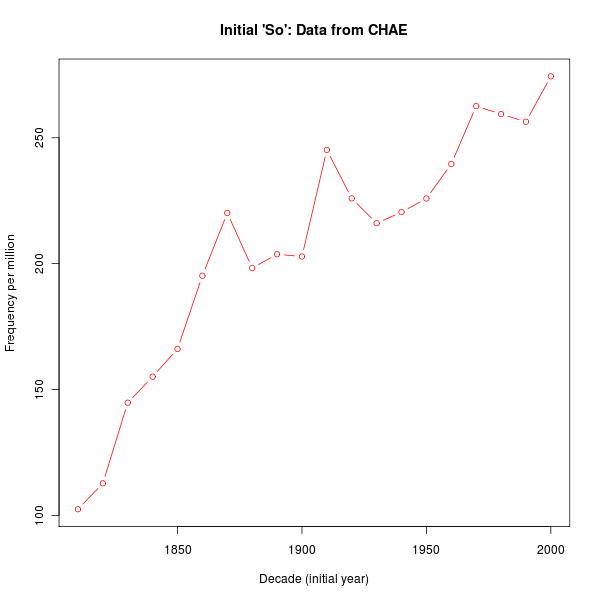
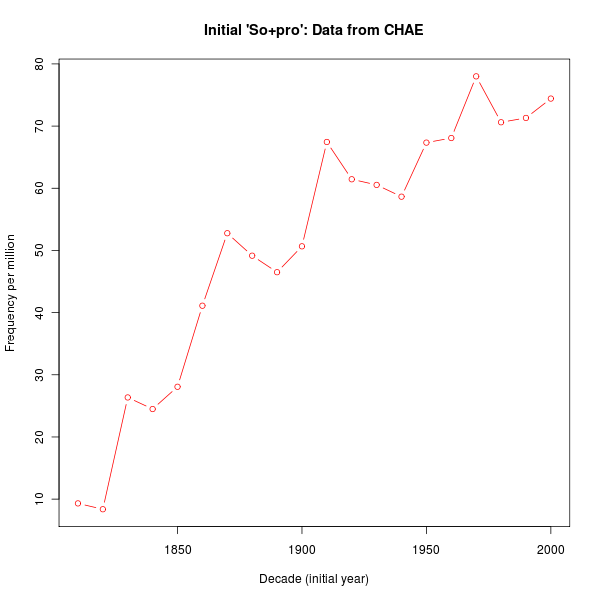
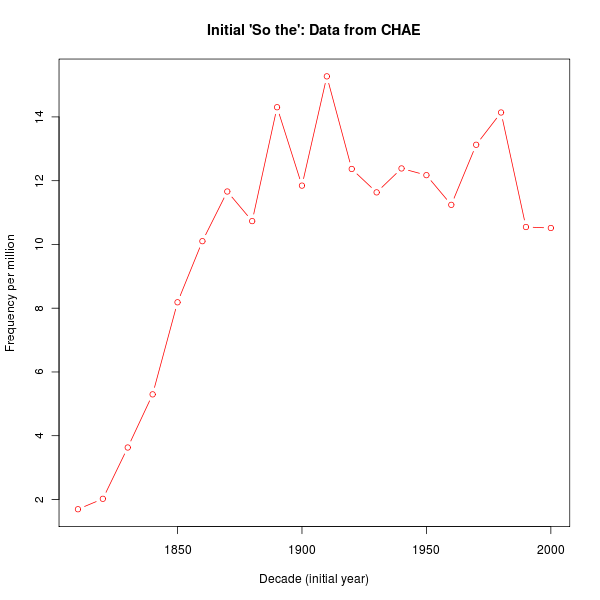
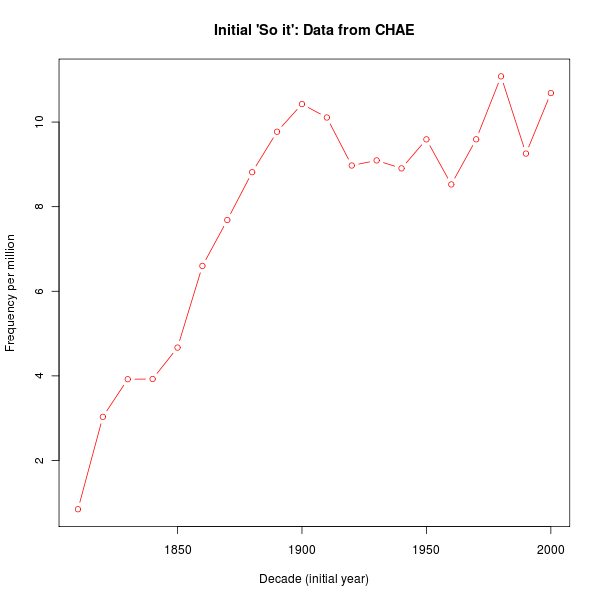
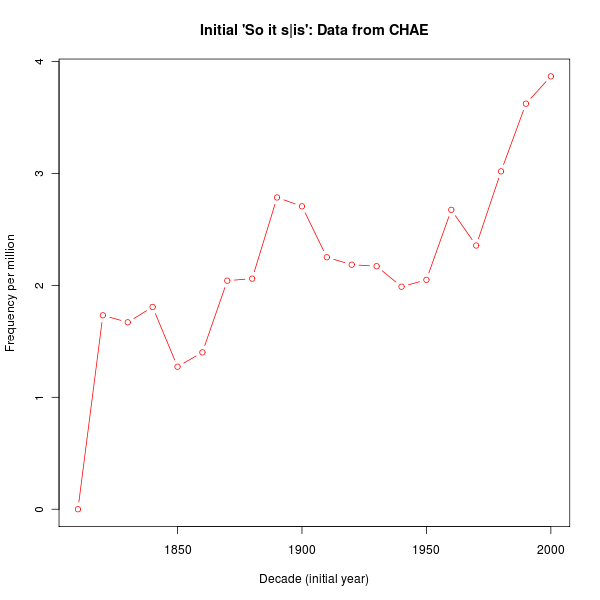
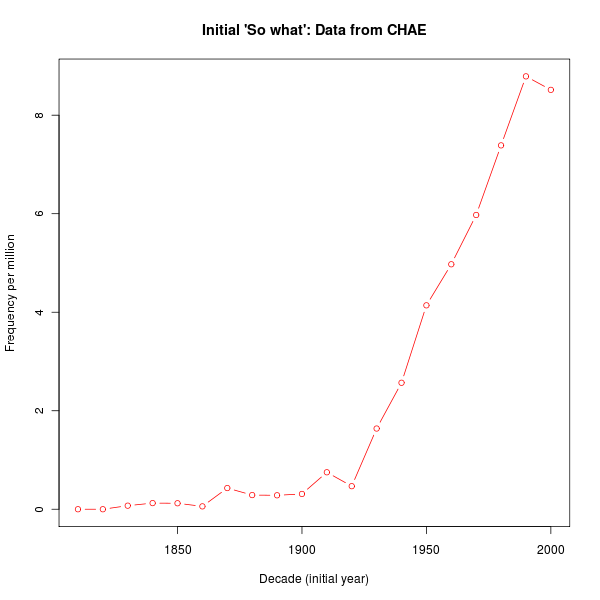
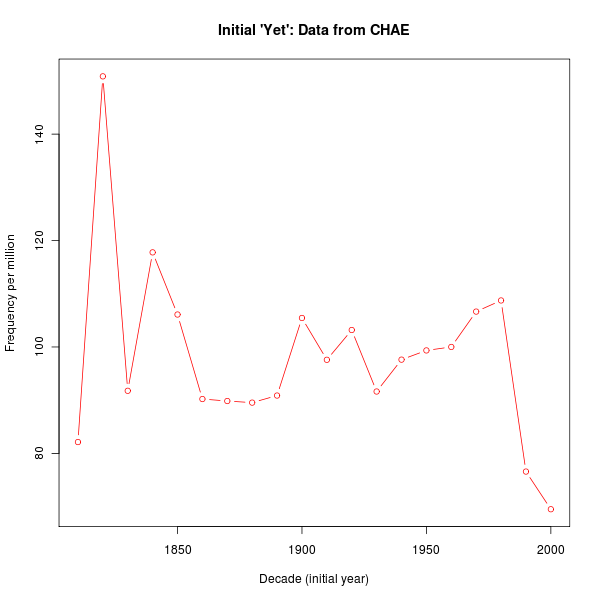
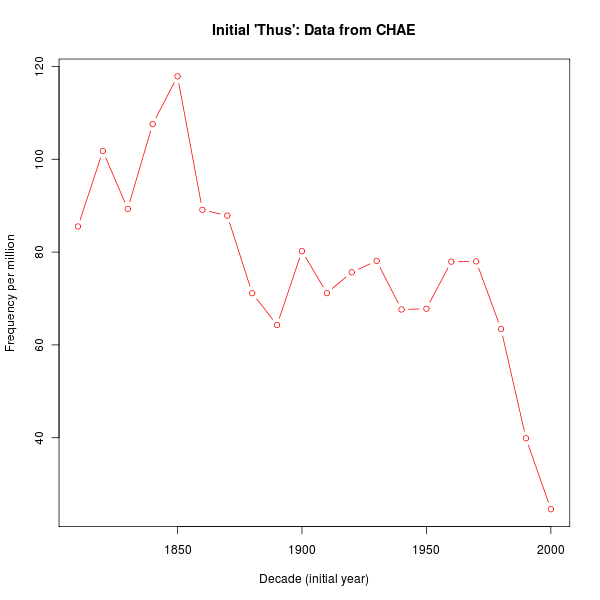
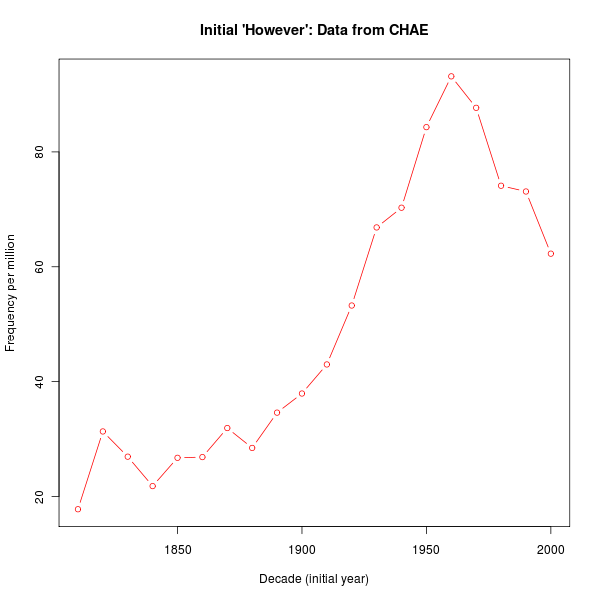
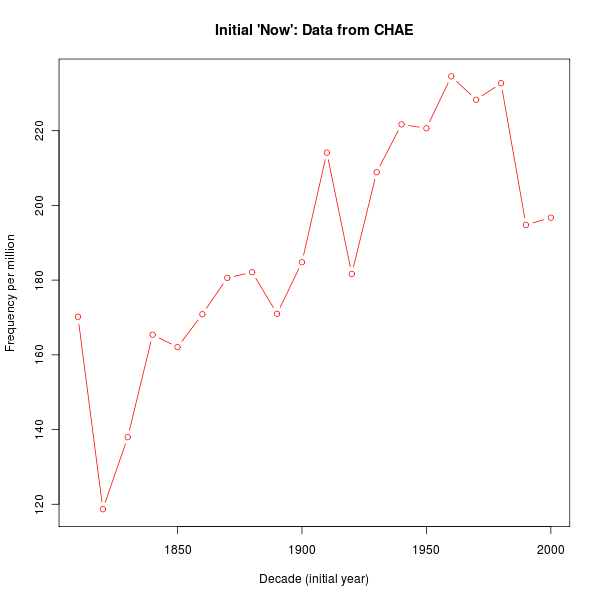
Noni Mausa said,
August 22, 2010 @ 9:54 am
Being rather slow on the uptake, I first noticed the initial "so" a few years ago in CBC radio interviews with scientists and scholars, generally on their show "Quirks and Quarks." The interviewer would ask a question, maybe on anthill work allocation research*, and the researcher would begin "So, our team decided individual labeling of the ants was feasible…"
The effect, at least to my ear, was to move the hearer right into the research work-in-progress, not to leave them peering in a window, but to bring them right into the room with those ants and their habits.
I felt that this verbal tactic was chosen by teachers (often researchers also) to draw the interest of their students. Now I have to revise my theory. Humph.
—-
*I did not make this up. http://www.nytimes.com/2009/04/28/science/28prof.html
DonBoy said,
August 22, 2010 @ 10:26 am
The most-classic case of this usage is when "So" is the very first word of the piece, or of the conversation; for written communication I'd expect to find it mostly in email. But my impression is that it's very largely a spoken-word thing and thus possibly not responsive to the corpus-search. (Or does that include transcriptions? Pardon my ignorance.)
Dan Lufkin said,
August 22, 2010 @ 10:32 am
Seamus Heany begins his translation of Beowulf with "So. The Spear-Danes in days gone by…." The "so" renders OE "Hwæt." Heany comments on his choice (Introduction, p. xxvii):
Brett R said,
August 22, 2010 @ 10:40 am
With all of Mark Davies corpus interfaces, you can calculate the frequencies using the numbers Mark L. gives above, or you can get the words per million by simply choosing the 'chart' display option.
Jonathan said,
August 22, 2010 @ 10:44 am
I remember it a lot growing up in the 60s and 70s. It could mean many things, including:
So? (what next?)
So? (So what? why is that important?)
So? (You still haven't answered the question I asked you a little while ago)
So… (the conversation has died down, what were we talking about?)
So anyway, (I'm coming back to a previous conversational topic)
So, (to introduce a juicy question: So … who was that woman I saw you with last night?)
So I was just sitting there, minding my own business (introduces a story, segueing from nowhere in particular)
And so… (this is the conclusion of something I've been talking about for a while)
So as a marker of conversational pacing and phatic communication "so" has multiple functions.
David Grill said,
August 22, 2010 @ 10:56 am
This is a confusing one for the German speakers I know. "So", as it is frequently used here in in Northern Hesse, is an interjection of finality appended to the end of a sentence. (German [zɔ] has as many different flavors of meaning as English [‘səʊ], but at the end of a sentence or as a stand-alone utterance, this one is prevalent) It is also used to accompany a physical action, or to complete a transaction. For example, when you hand a clerk at the cash register your money, or they hand you your change.
When I use it at the beginning of a sentence, be it German or English, I get some strange looks.
I freely admit any errors in IPA transcription, "I am only an egg".
Jeremy said,
August 22, 2010 @ 11:21 am
This discussion of "so" reminds me of a math professor I had once, back in 1996. The class was dreadfully boring, and was at 9:00 AM, a horrible combination for those of us who are completely not morning people. At first, I found the professor's British accent a hopeful sign, having been quite the Monty Python fan. Unfortunately, despite a mild superficial resemblance to John Cleese, he actually turned out to be exceedingly dull, teaching exactly what was already in the textbook, wandering slightly lost between two overhead projectors on which he wrote.
In a desperate attempt to keep myself awake through the class, I seized upon his verbal tic of using "so" as a filler whenever he paused to think. He also used "well" less often, sometimes both together. In the most extreme case, there would be a "so… well… so…" as he walked from the first projector to the second, only to realize that he wanted to be back at the first. In any event, in my effort not to doze off, I started counting the instances of "so". As I recall (it has been 14 or so years), his record was about 114 uses of "so" in a fifty minute class.
I suppose the relevant lesson from this anecdote would be that "so" as described was in use, to some extent, in 1996, but was unusual enough to be noticeable, at least when used with a high frequency.
Thomas Thurman said,
August 22, 2010 @ 11:43 am
So… around here, the children have a response to anyone who begins a sentence with "So" and then pauses: they immediately chant, "Sew buttons on your underwear!" This was current even when I moved to Pennsylvania almost ten years ago, which makes me doubt the recency of "so" as a sentence starter.
Mark Mandel said,
August 22, 2010 @ 12:00 pm
So this linguist walks into a discussion and is all set to say, "So what about beginning a joke or anecdote with 'so', which so far from indicating a discursal connection, seems to mark a complete absence of connection?"
And then he notices that DonBoy and Jonathan have already covered it.
So what can he do but make a joke of it?
empty said,
August 22, 2010 @ 12:25 pm
I used to count how many times my slow pompous old History of Science professor said "accordingly" in the course of 50 minutes. I have since wondered what verbal tics of mine are amusing my own students. I don't like to think about it.
Dick Margulis said,
August 22, 2010 @ 12:29 pm
The acquaintance in whose speech the initial so is prominent is a Canadian physician who moved to the U.S. as an adult. Given Noni Mausa's observation, I wonder if this might be something that arose in its current form in Canada and has migrated south. The sense I get when my acquaintance begins with so is that it means something like "this is the logical follow-up to a conversation we started at some point in the past that I've been thinking aboot." It feels different to me from the joke starter.
Coby Lubliner said,
August 22, 2010 @ 1:01 pm
The journalist Jon Carroll has been writing a column in the San Francisco Chronicle since 1982, and has been notorious for starting many of his pieces with "So" since the beginning.
Dan T. said,
August 22, 2010 @ 1:08 pm
As a kid, on seeing my mom's big stack of magazines devoted to artforms involving use of needles, some of which had "Sew" somewhere in their titles, my desire was that somebody start a magazine entitled "Sew What?"
The "So" usage I'm most curious about, however, is "That's so [name/pronoun]", with a proper name or personal pronoun, indicating that the speaker thinks some trait is somehow definitive of a particular person. It turns up a lot in post-2000 pop culture, as in the Disney/ABC TV series "That's So Raven", and song lyrics like Britney Spears' "'Cause to lose all my senses, that is just so typically me," [Oops, I Did It Again, 2000] and Kelly Clarkson's "That is just so you, coming back when I finally moved on" [Gone, 2004]. It's old, established usage to put "That's so [adjective]", like "That's so evil" or "That's so green", but putting a name or pronoun there seems more recent, and still sounds slangy and youth-oriented. Apparently non-proper/personal nouns still don't fit there, as it makes no sense to say "That's so telephone" or "That's so dictionary".
Debbie said,
August 22, 2010 @ 1:24 pm
@Dick Margulis, I don't know your acquaintance, but have never met a Canadian who uses 'aboot'. Perhaps it is an east coast dialect but to be honest, I've only heard this pronounciation from Americans imitating Canadians.
http://www.youtube.com/watch?v=BRI-A3vakVg
As for so, I tend to use it when I'm nervous and I'm trying to begin a conversation. I wonder if it were pointed out to people using it to begin sentences, we would discover a similar emotional state?
Qov said,
August 22, 2010 @ 1:46 pm
Dan T., that's so 2007.
Debbie: Americans and Canadians use a different vowel in the word about. Canadians don't hear a marked difference in the way Americans say it. Americans hear the difference, but they don't make a distinction between the Canadian ou sound and their own oo sound, so when they mimic the Canadians, they say oo and the Canadians are confused because we use the two sounds differently.
Another way to say it is that Canadians and Americans chop the continuum between ow and oo in different places.
And this is proof that I really should learn IPA.
Dan S said,
August 22, 2010 @ 2:04 pm
So should the frequency of, say, sentence-initial "so it's/is" be adjusted for the frequency of S-initial "it's/is"? In such a long-term analysis I could imagine that (underlying?) idiom having it's own trends.
Maneki Nekko said,
August 22, 2010 @ 2:21 pm
"…it makes no sense to say 'That's so telephone' or 'That's so dictionary'."
Disney Channel produced a Kim Possible animated movie called "So The Drama."
George said,
August 22, 2010 @ 5:06 pm
@Noni: "I first noticed the initial "so" a few years ago in CBC radio interviews with scientists and scholars, . . ."
Yes, this has been my observation as well. What seems to be new is not a sentence initial 'so,' but a discourse initial 'so.' This 'so' precedes some explanatory discourse and seems to be used predominantly by academics. I cannot picture a plumber saying, "So, water pipes are prone to freeze when . . ."
George
Rubrick said,
August 22, 2010 @ 5:54 pm
Out of curiosity, Mark, do you actually eat anything for breakfast, or does linguistic research itself serve as sustenance for your species?
Julie said,
August 22, 2010 @ 5:58 pm
I don't know that I'm hearing "so" any more than I ever did. What I do notice is that people stress it more. Sometimes even spelling it "soooooo." I think I've been hearing "That's so yesterday," and "That's so last year," a long time. They still sound pretentious.
Qov, you explained that nicely, even without the IPA. Most Americans can hear the different sound, but can't pronounce it at all, so we map it to the nearest sound we can actually say. I'll take a stab at the IPA, though. I don't have a trained ear for this, but I think Canadians say something like /əʊ/ where most Americans say something closer to /aʊ/. This source might be useful: http://www.yorku.ca/earmstro/ipa/diphthongs.html Unfortunately, it doesn't show the Canadian "ow" diphthong.
Debbie said,
August 22, 2010 @ 6:25 pm
@QOV, I have American made adaptive software which pronounces about ah-b-out. The 'ou' sounds like it does in 'out', 'ouch', 'hour', 'our' and, 'owl'…. Like you hit your funny bone and said, 'ow'. (As in the clip). NOt like an owl "ooo", as in 'boot', 'you', 'fool'. Are you saying that I say it differently than I hear myself saying the word as in a previous LL blog that addressed this? http://languagelog.ldc.upenn.edu/nll/?p=2493
Murray Smith said,
August 22, 2010 @ 6:41 pm
It struck me, last spring at MIT, at the end of a talk on vision or memory or something like that, when five of the first six questions began with "So", followed by a pause, and then the question.
John Cowan said,
August 22, 2010 @ 7:33 pm
I don't think that Americans actually hear Canadian-raised "ou" as their GOOSE vowel; it's much closer to the GOAT vowel. Pretending that Canadians say "aboot" is just a stereotype that's meant to be funny, like the one about the Scotsman who comes to America and is taken to the local zoo. After seeing the moose (extinct in the British Isles), his comment is "Well, if that's your moose, I dinna want to see your rat!"
Jonathan Lundell said,
August 22, 2010 @ 7:46 pm
You hear the academic discourse/explanation-inital 'so' quite a bit on NPR's Science Friday, too. It's got a different feel than the other sentence-initial senses, seems to me.
Jonathan Lundell said,
August 22, 2010 @ 8:04 pm
The disquisition-initial so is roughly synonymous (and used by roughly the same people) as "It turns out that…".
Jonathan Lundell said,
August 22, 2010 @ 8:17 pm
"synonymous as"? Shame to do that on the only blog where the readers won't be able to figure out what my broken parallel means…. Oh well.
Dan T. said,
August 22, 2010 @ 8:43 pm
OK, "So Yesterday" (a Hilary Duff song title), "so 1995", etc., are also found. It appears that "So" can take a noun indicating a place or time as well as one indicating a person, but all these usages still have a colloquial sound to them compared to the standard-English "So [adjective]" usage.
How about "I'm *SO* over it!" There, "so" takes a preposition phrase after it, and also generally takes strong emphasis on the "So".
John Roth said,
August 22, 2010 @ 8:46 pm
A minor point on formatting: a quick look at the charts gives the impression that whatever was being analyzed had zero frequency at some point, because the Y axis doesn't begin at 0. In the first chart the variation is approximately 3:1, rather than rising from completely unused.
I use so in dialog initial (not sentence initial) a lot. I'm not sure where I started, but I'm sure I haven't done it all my life.
Steve Morrison said,
August 22, 2010 @ 8:46 pm
So, I know this one blog where almost every entry begins with the word "so":
http://sacnoths.blogspot.com/
Terry Collmann said,
August 22, 2010 @ 9:16 pm
My impression (as a Briton), through editing copy by native English speakers from around the world, is that sentence-initial so is an American habit rarely if ever used by British writers, at least. It's certainly something I only started noticing when I began editing work by American journalists.
Jerry Friedman said,
August 23, 2010 @ 12:11 am
I've been a sentence-initial and discourse-initial so-er probably as long as I've been able to talk. At least, my father says, "So nu already?" when the driver in front of him doesn't notice that the light has turned green, and I probably got it from him. (As many Americans will understand, the l in already is silent, at least in phrases such as that one.)
My lecturing tics—that I'm aware of—are So, Okay, and So okay. Occasionally I stop myself in time.
And before we get all Canadian about this, what about New York?
That's from Little, Big (1981), one of the great novels of the twentieth century, even if I'm not sure what Crowley means by "vocable".
Julie said,
August 23, 2010 @ 2:46 am
John Cowan: I think you listen to far more educated Americans than I do…I'm sure that I know people who will swear up and down that Canadians say "aboot." I had a Canadian housemate for a couple of years, and I would not compare that sound to my GOAT vowel. An English GOAT vowel maybe, but not mine. It's not my GOOSE vowel either, but something else entirely.
JanetK said,
August 23, 2010 @ 4:47 am
I thought for some time (and listening carefully to people seemed to confirm it) that 'so' was used by some people as a method of dividing conversation time. 'So' followed by a little pause meant I am about to speak and I want your attention without interruption until I am done. A pause followed by 'so' and then silence meant I am finished speaking and you can now continue the conversation. People who do this as a sort of reflex all the time are not common, but many people do it occasionally.
groki said,
August 23, 2010 @ 6:06 am
JanetK:
your "so [pause] [speak] [pause] so" makes me think of a conversational version of opening-and-closing HTML tags.
D. Sky Onosson said,
August 23, 2010 @ 11:33 am
So, I just presented some research on Canadian Raising (the diphthong alternation which has come up in the discussion here).
My research looked at the other diphthong involved, the "eye" vowel as in wide or white, not the "ow" vowel. What really surprised me is that there doesn't seem to be a difference in vowel quality so much as vowel duration – the vowel in wide is almost double the length of the vowel in white.
However, those who don't use Canadian Raising seem to hear the difference between the two as one of vowel quality – as different vowels rather than the same vowel with different length. I'm not sure why that is, though perhaps it's connected with the fact that vowel length in English is non-phonemic.
Rodger C said,
August 23, 2010 @ 12:12 pm
As the semester begins, I'm reminded that I've develoed the habit of starting every class with "So then!" This would seem to mean "As we were saying last time, as you surely remember …" Its actual functional meaning, of course, is "Shut up now."
exackerly said,
August 23, 2010 @ 12:12 pm
So we march into the present
And it's always rather pleasant
To speculate on what the years ahead of us will see
For our words and thoughts and attitudes
All our novelties and platitudes
Will be rather ancient history in 2033…
USA, by Rosemary and Steven Vincent Benet
Which I memorized for English class in 1961 and have been unable to forget ever since…
KevinM said,
August 23, 2010 @ 12:31 pm
The initial "so" is also an implementation of the narrative technique of beginning a story in media res. "So this guy walks into a bar…"
chris said,
August 23, 2010 @ 2:12 pm
As the semester begins, I'm reminded that I've develoed the habit of starting every class with "So then!" This would seem to mean "As we were saying last time, as you surely remember …" Its actual functional meaning, of course, is "Shut up now."
That sounds very much like Hwaet! (see Dan Lufkin's comment above).
Joyce Melton said,
August 23, 2010 @ 3:31 pm
Canadian 'ou' is really a short version of 'oa'.
That is, Canadians don't say 'a boot' for 'about', they really say something that sounds more like 'a boat' but with a shortened vowel instead of the near diphthong 'oa' usually gets.
And Canadians are not the only one's who do that. It's mostly people from Ontario and Toronto especially, but the same pronunciation can be heard in areas near Charlottesville, Virginia, parts of North Carolina, and occasionally in Utah.
After the American Revolution, Tory Loyalists, including ones from Virginia and North Carolina, were given land in Ontario so that may be a connection. The quirk can probably be traced back to settlers from Northern Ireland (Scots-Irish as they are called in the US). Which might explain the sometimes usage you hear in Utah.
Joyce Melton said,
August 23, 2010 @ 3:33 pm
Curious to see the note including Heinlein's name at the end of the article; RAH frequently used initial-so in dialog, especially the didactic interludes of which he was fond.
Nathan Myers said,
August 23, 2010 @ 4:49 pm
If I were to write the way I hear Canadians say "about", I would write "abehwt". I don't hear an "o" in there at all.
D. Sky Onosson said,
August 23, 2010 @ 6:13 pm
@Joyce Melton: as far as I was able to determine in my data (recorded in Manitoba, not Ontario) the short diphthong really is nearly identical to the long one in terms of the vowel formants (which theoretically correspond to the position of the tongue – I don't have direct physical measurement data). The brevity of the shorter diphthong seems to lead to its starting position being relatively underperceived compared with the longer version – but when you look at the spectrograms they really do seem to be the same vowel.
Debbie said,
August 23, 2010 @ 8:29 pm
@Julie, I think you are on to something here. As the representative for all Canadians :) and with my (ahem) expert British accent, I made the substitutions you suggested and voila, just about right (as I hear myself). Please note the tenor of the comment is tongue in cheek.
@Nathan, not so sure about (he he) that pronounciation. Are you getting closer to 'bough' perhaps?
@Sky: Fascinating! As a Canadian narcisist. (I'm from the Toronto area) and do say the 'i'sound longer in wide. I also seem to break it from the 'I' sound to a 'ee' sound as in wh-eye-te. I think I lower the intonation of the second half of the 'I' sound.
D. Sky Onosson said,
August 23, 2010 @ 8:45 pm
@Debbie:
My speakers (Manitobans) split the longer wide vowel into two distinct parts. The first half of the vowel is basically a long steady /a/, while the second half carries all of the diphthongal movement. The white vowel lacks that first half, and only has the movement part – but importantly, they both start at the same position (roughly /a/). This flies in the face of the traditional view that white has a "raised" allophone (hence "Canadian Raising"), and was surprising to me. I presume that, since the starting position for the shorter allophone isn't "held", we don't perceive it the same way – but that's just speculation on my part.
As I said above, I didn't look at the "ow" vowel, so I can't say for sure whether a similar thing is happening there – but I suspect that it is.
Debbie said,
August 23, 2010 @ 9:37 pm
@Sky, sorry but this is really too technical for me, although I wish I could grasp it because it's interesting. As for your speculation on the 'ou' sound in about, is there another word to compair it with as you did with white and wide? (I'd like to try saying both to see if I can hear the difference.
Debbie said,
August 23, 2010 @ 9:50 pm
@Sky, btw-I use ZoomText adaptive software and I hear the distinction between the two words in the voice component!)
I seem to cut the voiced 'i' sound in white when my tongue touches the roof of my mouth where in wide I cut the sound just before. I also form the 't' with the tip of my tongue and the 'd' a little farther back so maybe that is why I cut the sound sooner.
Jerry Friedman said,
August 23, 2010 @ 11:09 pm
@D. Sky Onosson: I'm from Cleveland, and I might have a little "Canadian raising" making a difference between pouter and powder, but I have a much stronger effect of the kind you describe, distinguishing writer from rider and quire from choir. (And it feels to me like a difference in vowel quality, not length.) I have a similar distinction between hearty and hardy, in spite of the /r/. Is that also part of Canadian raising? I can't find anything about it on the Internet.
Debbie said,
August 23, 2010 @ 11:34 pm
@Jerry, I hear the difference when I pronounce those words as well in quality and/or duration depending on the sets of words. I definately concur fully with Sky for wide and white. Please excuse my ignorance but is Canadian raising the pitch of the vowel or something to do with tongue positioning?
D. Sky Onosson said,
August 24, 2010 @ 12:39 am
@Jerry: interesting that you bring up raising before /r/ – that was something I wanted to investigate, and only got it partially explored. The diphthong before /r/ seems to be in-between the other two allophones in terms of duration. I had noticed 'raising' in words such as fire, wire, hire etc. I also have a slight distinction between hire (more "raising") and higher (less "raising"). I wonder if you have a similar distinction?
@Debbie: an example with "ow" is loud vs. lout. Canadian Raising has usually been analyzed as a different in vowel quality i.e. tongue position, where the allophone before voiceless sounds is "raised" (higher) than the other allophone. However, as I say, from my data it seems to be more a difference of duration than height, although it seems to be generally heard as a difference in quality (tongue position).
D. Sky Onosson said,
August 24, 2010 @ 12:44 am
@Jerry: "Canadian Raising" has been described in Michigan and Ohio before, possibly elsewhere, especially in terms of the "eye" vowel (not so much for the "ow" vowel) – so it's not too surprising that you have it too. It's definitely a different situation in Canada east of Ontario, so don't let the "Canadian" part of the term fool you – it's not limited to Canada, and it doesn't happen everywhere within Canada, either.
Qov said,
August 24, 2010 @ 2:11 pm
It's very plausible that people hear vowel length and interpret it as vowel quality in the wide/white example. I was once with a group of people trying to help an ESL speaker distinguish between "I can do that" and "I can't do that." The native speakers were insisting that there was a t sound in the latter. But there wasn't, in normal speech, but we could all hear the difference. I think the actual difference was in the vowel in can.
My point being that people don't necessarily know how they tell words apart.
groki said,
August 24, 2010 @ 2:43 pm
Qov: for me it's not just the vowel. between can/can't and do:
"I can do that" has a smooth n-to-d transition;
but "I can't do that" has a halt or hitch between the n and the d (it's like a glottal stop, but at the front: a dental stop? a velar stop?).
I agree the hitch is not a t sound , so I take your point that people don't always know what they think they do.
Jerry Friedman said,
August 24, 2010 @ 2:46 pm
@Sky: Thanks for the information. Yes, I have raising in hire but not in higher, and likewise in fire but not in pyre (an example from Labov's article in the old American Heritage Dictionary, as I recall).
Is raising in hearty but not hardy a similar phenomenon?
D. Sky Onosson said,
August 24, 2010 @ 4:01 pm
@Jerry: I'm not so sure about hearty/hardy – I'd really be stretching it to claim I make/hear a difference. However, if we make it heart vs. hard, then I can see a difference there. Here's another one for you: pint vs. pined – how different are the vowels??
Debbie said,
August 24, 2010 @ 4:15 pm
@Sky, I think I'm hearing the difference not in the vowel but in the duration of the 'n' sound for pined and pint and with the voiced d in pined..
Bob Ladd said,
August 25, 2010 @ 5:03 am
I'm with Noni and George on this one – George's formulation ("not sentence-initial but discourse-initial") strikes me as exactly right. The pause mentioned by a couple of people is also relevant – the usage in question usually has a prolonged vowel, on a fairly steady level pitch, followed by a pause before the rest of the discourse begins. I also associate it with geeks and academics (the person of my acquaintance who most uses this is a mathematician and computer scientist). Given the importance of the duration, the pitch, and the pause for defining this putatively new usage, I think it will be almost impossible to search for relevant examples in written text corpora.
Andrew said,
August 25, 2010 @ 8:49 pm
Curiously, sentence-initial "so" is less noticeable in Australia than a recent trend to sentence-terminal "so", or more accurately sentence-terminal "so …"
This is a verbal tic most common among interviewees, such as footballers, who appear to use it as a kind of bluntness-mitigation mechanism.
Interviewer: Do you think you'll win on Saturday?
Player: Yeah nah, we've had a really good week on the track and we know how important this game is, so …
marie-lucie said,
August 25, 2010 @ 11:16 pm
It seems to me that this topic was discussed perhaps two years ago here.
The term "Canadian raising" gives the impression that Canadians have innovated in raising the first part of the diphthong before voiceless consonants, while Americans have kept the original, lower sound, which also occurs before voiced consonants and finally. In fact, "Canadian raising" is likely to be a conservative remnant (it also occurs in some non-standard British varieties), while Standard British and American varieties have generalized the more open vowel to all positions (lengthening before a voiced consonant is a separate issue which also affects the other vowels and diphthongs, and is not limited to Canada either).
This term also implies that the phenomenon is uniform across Canada, but it is not, hence the varied reports from commenters above. In Nova Scotia where I live, the rural pronunciation of "about" sounds exactly like that of "a boat". One weather reporter on local radio refers to "the South" as "the Soath" (rhyming with "loath"). In some other areas of Canada, those words do not rhyme, but the vowel part of the diphthong is closer to a schwa rather than to a high-mid o, so that "about a boat" is not an exact repetition as it is in rural Nova Scotia. It also seems to me (but I have not done focussed research) that for some younger educated women in many parts of Canada the vowel part of the diphthong sometimes sounds like the "a" of "cat" – that may be a hypercorrection in order to avoid the rhyme with "a boat" (and it may also be an Americanism).
In any case, I have never heard anyone in Canada say "aboot", like "a boot".
For anyone looking for scholarly references, look for the work of James Chambers, a professor at the U of Toronto.
marie-lucie said,
August 25, 2010 @ 11:27 pm
Initial "so" used by interviewees:
When a guest such as a scientist appears on a serious talk show, there is usually a preliminary, rehearsal interview done before the one that is recorded and heard by the public. Among other things, this rehearsal ensures that the guest is comfortable, prepared for the questions, and is not going to be stuck searching for words while the public just hears "er… er…". The interviewer too will tailor his/her questions to elicit responses from the guest, and will also be able to intervene with a prompt in case of memory lapses. "So", the guest's first words heard by the public are probably not the very first words spoken to the interviewer.
D. Sky Onosson said,
August 26, 2010 @ 12:26 pm
@ marie-lucie:
I can't speak to the historical status of Canadian Raising, though I don't think it's a foregone conclusion that it is either an innovation or a relic. I haven't found anyone who's really researched the issue, though if you can point me to someone I'd love to read their work! We also shouldn't assume that, even if it is a relic, that is hasn't changed or isn't undergoing change now.
One of the areas I'm really interested in is how the perception of a "raised" vowel correlates with the phonetic details of the vowel in fact, as they do not necessarily coincide as one might expect. I did* some detailed acoustic studies of Manitobans which reveal that raised vs. unraised vowels don't differ significantly in terms of vowel formants at the onset** – that is, they are not qualitatively different – but they do differ substantially in terms of vowel duration. It's the durational differences which seem to be picked up on by listeners, but are perceived as "raising" by those with a different dialect.
Anyways, this is a really interesting area of study which has not been completely explored by any means.
* This unpublished research forms the basis of my M.A. thesis which is soon to be accepted pending revisions – I hope to turn it into a publishable paper at some point.
** Erik Thomas has noted qualitative differences in vowel offset among Americans as far south as Texas, which I noticed in my speakers too (especially for F2 which correlates with vowel fronting – not raising). This is interesting, as it's almost never noticed by anyone that the end of the diphthong is different!
Mar Rojo said,
February 14, 2014 @ 4:37 am
Hope someone's still interested. This is from a questioner on the fb page, Grammarly:
Any thought?